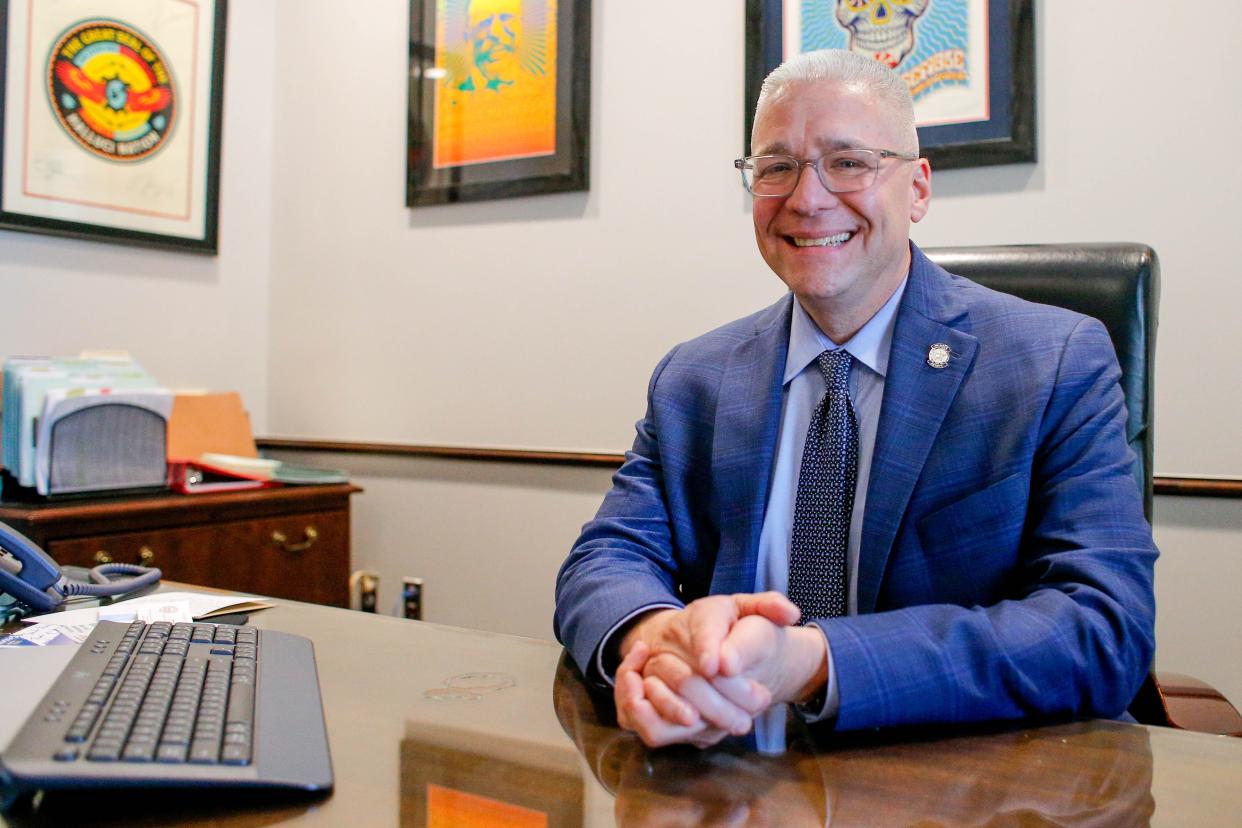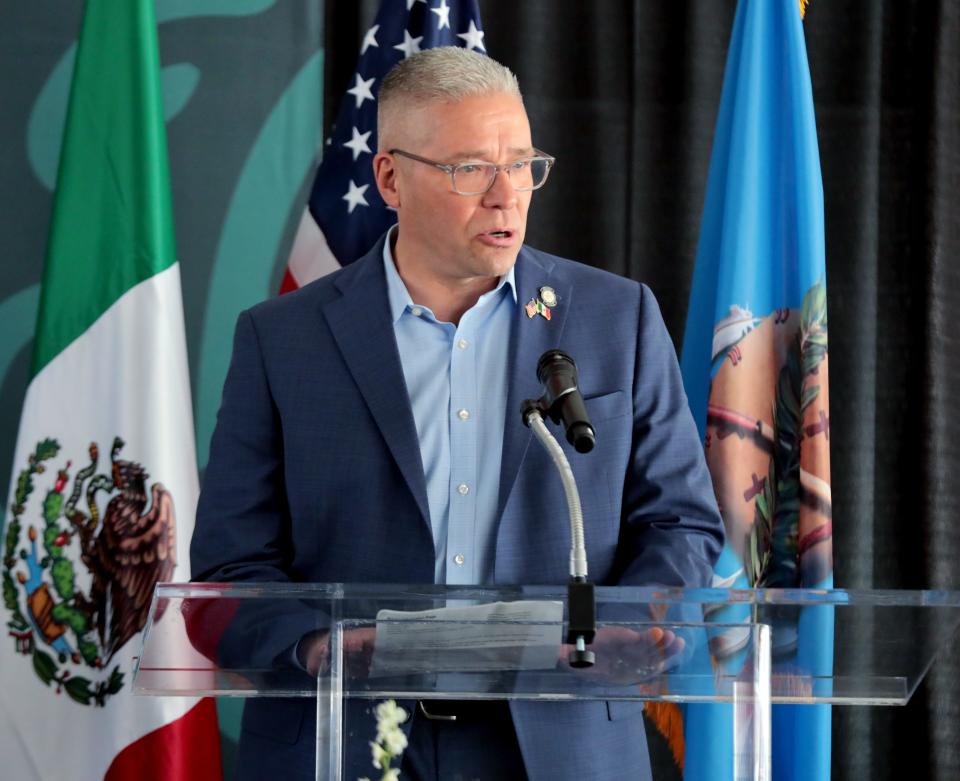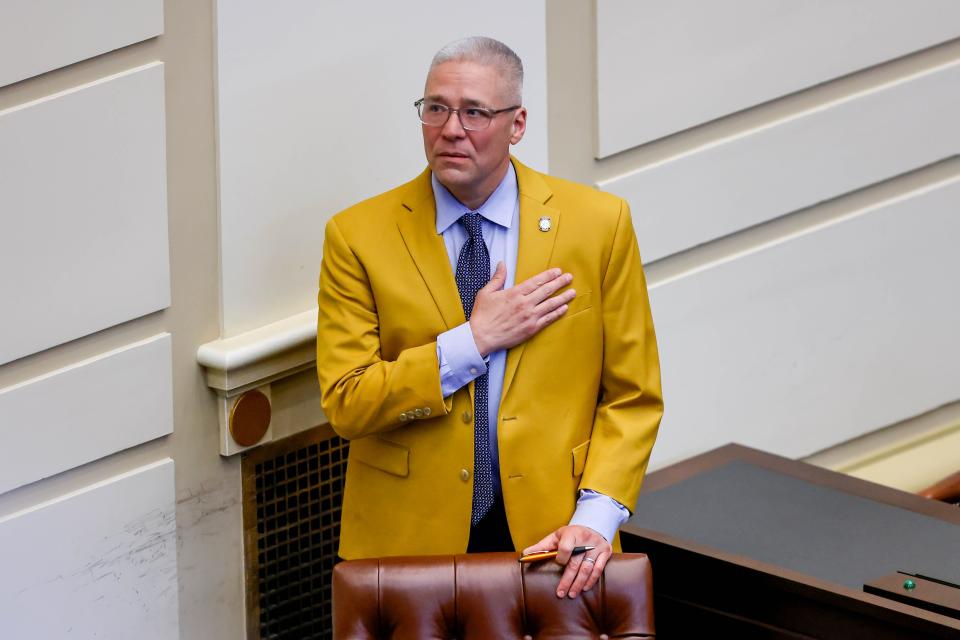State senator wants Oklahoma's Latino voices to be heard in community, politics

Michael Brooks-Jimenez was born and raised on the south side of Oklahoma City. Now he's that area's Democratic state senator and pushing hard to increase Latino representation throughout the city and the state.
"My great-grandfather came to Oklahoma City to work on the railroad, and once he was settled, he sent for my great-grandmother to come. She actually came in a covered wagon with her three kids at the time. This was probably in the teens, soon after Oklahoma became a state. So, my mom's side of the family was probably one of the first Mexican families to come to Oklahoma," Brooks-Jimenez said in a recent interview.
The family settled in an area near the Canadian River then known as Walnut Grove, or often "La Rana," the Spanish word for "frog," to residents because of the nightly soft croaking of small river frogs up and down the river. Much of that area is gone, now, lost to highway routing, commercial development and riverbed changes.
But Little Flower Catholic Church remains an enduring symbol of Latino heritage at SW 10 and Walker Avenue, still carrying on its vibrant ministry to Hispanics and others after more than 100 years. And Little Flower Church was where Brooks-Jimenez's grandmother and mother both found their calling.

Q: Your roots are deep in the city's Latino culture.
A: Some of my earliest memories are from attending Little Flower Church, which is historically and predominantly Latino. My mom always instilled a great pride in me and my sisters of our Latino heritage. When President Reagan started the amnesty program, my grandma and my mom started an amnesty school at Little Flower, and since I was in high school I was often called upon to "volunteer." My mom, Patricia Jimenez-Brooks, was always an inspiration to me, and my grandmother, Marguerite Jimenez.
Q: You went to law school and then went to work helping community members with legal issues.
A: I put an ad in the Spanish newspaper that I spoke Spanish, when that wasn't completely true. And so clients started coming. I had my very own kind of Spanish immersion class every afternoon with clients.
More: Multiple Oklahoma City Public Schools board members are Latino. Why that's important
Q: Were your parents reluctant to use Spanish in the home?
A: No. My mom was the first in our family to go to college. She actually taught English as a second language in conversational Spanish. Unfortunately, it was a lack of cooperation from me and my sisters when she tried to teach us when we were young.
Q: Being bilingual is such an asset today.
A: Agreed. I don't think I would have been able to start my practice had it not been for the opportunity to find a niche by being a bilingual attorney.

Q: When did your attention turn to politics?
A: My mom was very politically active, and so my earliest political memory was putting out door hangers for Keith Leftwich when he ran for the House of Representatives (Leftwich died in 2003 at the age of 49). He was an iconic kind of state rep and then senator for the south side of Oklahoma City. I was always impressed with his dedication to his constituents. That kind of planted the seed.
Q: You were unsuccessful to begin with.
A: I ran for the first time in 2014 against Ralph Shortey. And when you run against an incumbent, you know, sometimes the cards are kind of stacked against you. So I basically shut the door. But then in 2017, when Senator Shortey got into trouble ... the door ended up reopening up for me. My phone rang off the hook.
More: This Douglass tennis star has revitalized the sport in his community
Q: You've since become a leader in the state Senate (vice chair of the Democratic Caucus). Did you have an opportunity to engage the legislative leaders and the governor with respect to the border security legislation recently approved and signed into law?
A: Yes. I definitely reached out to the governor to express my concerns. And the Senate is a collegial place thanks to the leadership of (Senate Pro Tem) Greg Treat. People are respectful of each other. Unfortunately, we are in an election year, and we have people who are ... trying to capitalize on a highly politically charged issue right now. It was pushed through without going through the normal processes like a committee meeting or anything like that. And I think that is evidence that this policy isn't well thought out.

Q: Do you detect real concern in the Latino community about the implications of this new law?
A: Absolutely. That's the heartbreaking part of all this — passing what most likely is an unconstitutional bill — the alarm that it causes in our community and the lack of certainty. I'm receiving calls from parents asking whether it's safe to send their kids to school, people who have been here long-term asking whether they should sell their house and move somewhere else. Some of the law enforcement jurisdictions have tried to assure the community that this won't be a priority for enforcement. But that doesn't change the fact that the law is on the books. If it's not intended to be enforced, why did we pass it? It breaks my heart that some victim of domestic abuse, who suffers abuse on a daily basis and believes perhaps her life is in danger has to make the very difficult decision of whether or not to continue to endure that abuse or take a chance on calling the police and if she's undocumented she might be arrested.
Q: Will this law have a deterrent effect and make OKC a place where Latinos will not want to come?
A: I would say at this point that Oklahoma City is flourishing, in large part because of the workforce is an immigrant workforce, particularly in areas such as agriculture, hospitality and construction. I know that immigrant labor drives the economy in the state, and passing a law like this, when we're focused on trying to grow our workforce, is going to have a negative effect. I'm proud to be from Oklahoma, but it's a shame that there have been periods of transition whether it be Native Americans, African Americans or Latinos that there have been issues with us fitting in and becoming a part of the community.
This article originally appeared on Oklahoman: OKC's Latino community alarmed by state's new immigration law

